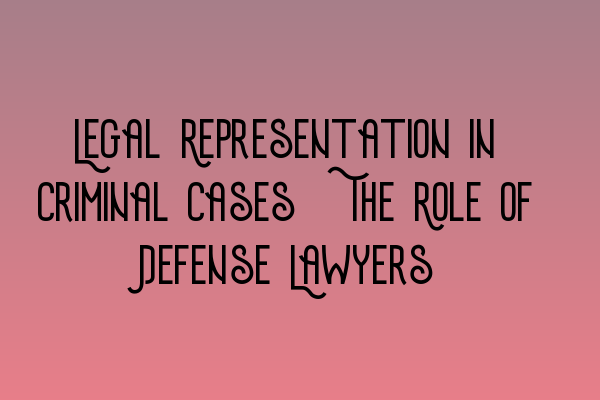Legal Representation in Criminal Cases: The Role of Defense Lawyers
In criminal cases, the role of defense lawyers is crucial. They play a vital role in ensuring that individuals accused of committing crimes receive fair and just legal representation. Defense lawyers are legal professionals who specialize in defending individuals charged with criminal offenses.
Defense lawyers have the responsibility of protecting their clients’ rights, guiding them through the complexities of the legal system, and advocating for their best interests throughout the criminal proceedings. They are trained professionals who possess a thorough understanding of criminal law and the legal processes involved.
The Responsibilities of Defense Lawyers
Defense lawyers perform a wide range of responsibilities to provide effective legal representation to their clients:
- Legal Advice: Defense lawyers provide valuable legal advice to their clients, explaining the charges they are facing and the potential consequences. They ensure that their clients understand their rights and options.
- Case Investigation: Defense lawyers conduct thorough investigations into the circumstances surrounding the alleged criminal activity. They gather evidence, interview witnesses, and analyze the prosecution’s case to identify potential weaknesses or inconsistencies.
- Courtroom Representation: Defense lawyers represent their clients in courtrooms and present their case to the judge and jury. They challenge the prosecution’s evidence, cross-examine witnesses, and present strong arguments to support their clients’ innocence or mitigate the consequences of the charges.
- Negotiation: Defense lawyers often engage in negotiations with prosecutors to seek favorable outcomes for their clients. They may negotiate plea bargains, reduced charges, or alternative sentencing options in order to achieve the best possible result.
- Legal Strategy: Defense lawyers develop sound legal strategies tailored to their clients’ specific cases. They analyze the strengths and weaknesses of the prosecution’s case and devise a defense strategy that addresses those factors effectively.
- Client Support: Defense lawyers provide emotional support and guidance to their clients throughout the challenging legal process. They ensure that their clients are informed and prepared for court appearances, helping them navigate through the complexities of the criminal justice system.
Qualities of a Good Defense Lawyer
A good defense lawyer possesses several key qualities that contribute to their effectiveness:
- Knowledge of Criminal Law: A proficient defense lawyer has a deep understanding of criminal law, including statutes, regulations, and legal principles. This knowledge enables them to develop strong legal arguments, identify potential defenses, and navigate the legal system effectively.
- Excellent Communication Skills: Effective communication is crucial in the field of law. Defense lawyers must be able to articulate complex legal concepts to their clients and present compelling arguments in court. They should have excellent listening skills to understand and address their clients’ concerns.
- Analytical and Critical Thinking: Defense lawyers must possess strong analytical and critical thinking skills to evaluate the evidence presented by the prosecution, identify inconsistencies or weaknesses, and construct persuasive arguments to protect their clients’ interests.
- Negotiation Skills: Negotiation is a common part of criminal cases. Defense lawyers need to have excellent negotiation skills to advocate for their clients effectively and achieve favorable outcomes. They must be persuasive and well-versed in negotiation tactics.
- Emotional Intelligence: The criminal justice system can be emotionally taxing for clients. A good defense lawyer should have the ability to empathize with their clients, provide support, and manage emotions appropriately to maintain a professional and effective attorney-client relationship.
In conclusion, defense lawyers play a critical role in the criminal justice system. They provide legal expertise, strategic representation, and advocacy for individuals accused of crimes. Their knowledge, skills, and dedication are essential in ensuring fairness, protecting rights, and achieving just outcomes. If you require legal representation or want to learn more about the legal profession in the UK, be sure to check out our related articles:
- SQE 1 Practice Exam Questions
- SQE 1 Practice Mocks FLK1 FLK2
- SQE 2 Preparation Courses
- SQE 1 Preparation Courses
- SRA SQE Exam Dates
At SQE Criminal Law & Practice Law UK, we are committed to providing high-quality legal education and support to aspiring legal professionals. Contact us today for more information.
